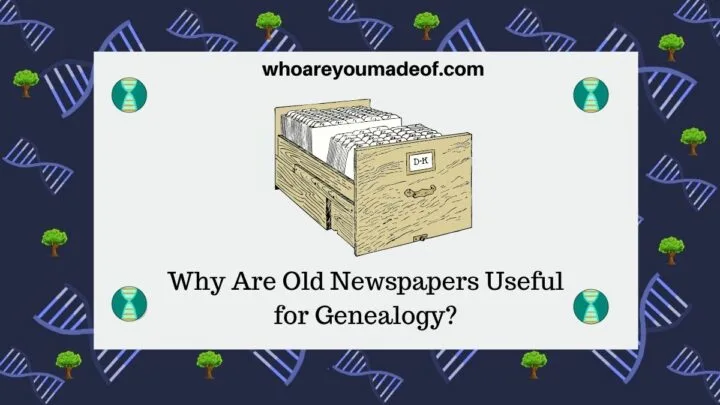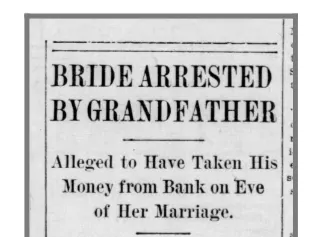If you aren't using old newspapers for genealogy research, you might be missing out on very valuable details for your family tree. In this post, learn exactly what you might learn from newspaper archives, and why they are important for discovering your ancestors.

When I first got started learning about my ancestors, I was confident that old newspapers would not be a good source for family tree information. To my knowledge, none of my recent ancestors had done anything worthy of mention in the newspaper, and so I didn't think I would be able to find anything interesting about them in paper.
As it turns out, local newspapers used to play a much more important role in a community. This also means that many members of that community were important as sources of news.
After perusing old newspaper articles, I also realized that the modern definition of what is "newsworthy" is also different than what it was several decades ago. This is a good thing, and it means that even those of us descended from non-famous (or non-infamous), regular people might have luck finding our ancestors mentioned in their local paper.
What is the importance of old newspapers as a source of family history?
Newspapers can be an important primary or secondary source of information about a person, event, location, or even time period. While genealogy documents such as vital records can provide us with hard facts and dates, newspapers can provide valuable context.
How can old newspapers be useful to family tree research?
Old newspapers are a very important source for genealogy research. Below, you will find the top five reasons that old newspapers are an important and useful part of genealogical or family tree research.
Old newspapers contain ordinary stories about regular people
The 21st century has seen newspapers consolidate and serve broader markets, which has meant that the readers of those newspapers cover a wider geographic area. This trend, combined with technologies that make it easier to learn about national and international news topics, mean that there is less space for news items about local events and individuals.
In other words, the definition of "newsworthy" has had to change. 100 years ago, we might have read an article about a fender-bender, a wedding anniversary celebration open-house, or a house fire, in the local paper.
Today, those articles have given way to international and national news reports, political editorials, and general interest cultural pieces.
While I can't say which newspaper provides more value in general, I do know that we are unlikely to ever again see details about a local resident's visit to her mother-in-law's home in a neighboring county, details about how much money a local citizen's estate will split among her various children, Sunday school lessons from church that week, or full-page fictional stories.
If you can't believe that old newspapers used to write about those sort of topics, don't take my word for it. You will be surprised at what you can read about in newspaper archives.
You can learn small details about your ancestors
We can often use old newspaper articles to learn additional details about our ancestors' lives. These are usually details that we would not discover any other way because they were not preserved in other documents.
I am reminded of an article about one of my German immigrant ancestors in Chicago. One of his granddaughter's stole his life savings from him, which was notable because he had already lost his life savings in the Great Chicago Fire.

We can discover new information about other relatives, and even ancestors, through reading newspaper articles. These new details can give us clues about where to look for other documents.
Through the article about the theft of my ancestor's money, I was able to learn about a different line of my family tree. His granddaughter is on a collateral line in my family tree, which means that she is not my direct ancestor.
Without the newspaper specifically mentioning her and a few other relatives, I would not have been able to piece together her line of my tree.
You might find biographical information for the family tree
Old newspaper articles or mentions of your ancestor might be able to help you fill in some gaps about your ancestor's family. For example, in an old death notice or obituary, you might notice a spouse, child, or sibling mentioned that was previous unknown to you.
While not everyone writes an obituary with genealogy in mind, we do find that most obituaries and death notices list living and deceased family members.
Even articles that seem "fluffy" compared to today's standards, such as mentions of a local resident traveling to see a relative in another area, can provide biographic information such as names, relationships, ages, and place of residence about relatives.
They might contain photographs or images
Searching through old newspapers for your ancestor's name might reveal a photograph or other image related to their life. Often times, this might be one of the only image that you can find to connect you to your relative.
You might find photographs from a wedding announcement, mug shot, or a group photograph of your ancestor participating in a community activity. Even our relatives who seem to have led their lives relatively privately may have had their photo printed in the newspaper along with their high school debate or sports team.
You might discover secrets
There are some things that we are likely to only be able to learn by studying old newspapers. For example, some families tend to not want to discuss negative information, such as the story of a relative stealing an ancestor's life savings, as I mentioned above.
Without searching old newspapers, I never would have seen the full-page obituary about a different ancestor who died in a train crash, or realized that my great-grandmother's father, once a successful farmer and businessman, went bankrupt.
He literally lost the family farm.
By searching old newspapers, I also learned that a recent ancestor was arrested for standing up for something that they believed in. When I brought it up to living family members, I found that that some relatives were embarrassed that my ancestor had been arrested, no matter the reason.
Instead of feeling embarrassed, I feel proud!
Discovering this story about my ancestor helped me understand a lot more about their life and relationship with other members of the family. In other words, it has provided context for other information that I have learned.
Newspapers can help you solve family tree mysteries
If you are struggling to find information about an ancestor and feel like you have encountered a brick wall, then you should consider checking their local newspaper archives. This is a very effective strategy for learning a few extra details about your ancestor and their life that might help lead you to another place to check for records.
Very often, the old newspaper articles can be the very clue that we need to break through that brick wall and make progress on our tree.
Conclusion
I hope that this post has helped you understand why old newspapers are an excellent source of information for family tree research, and that you are excited about searching your ancestors. Who knows what you might learn?
Through my research of old newspapers, I have developed a much deeper understanding of my ancestors and their lives. I also learned that they were human - just like me.
If you have any questions about something that you read in this post, or if you would like to share something interesting that you have learned from an old newspaper about a recent or distant ancestor, I would love for you to join us in the discussion below.
Thanks for stopping by today!

Bernadette
Sunday 8th of May 2022
People like to think of the Fifties as being innocent, but a look at even small-town papers will show otherwise. In my small Oklahoma hometown, I found a surprising number of murders, burglaries, arson and charges of child abandonment. Luckily, none of the perps were related to me.
Bernadette
Sunday 5th of December 2021
I found out some fascinating things about my great-grandfather through newspaper articles. As an Oklahoma legislator and Baptist preacher, he lost his seat when he voted against prohibition. He must have been a liberal Baptist. There was also an interesting story about how the community came together when his toddler died. They not only brought food but did the family’s laundry — no small task in those days. I also learned about some minor criminals on another branch of the family tree.